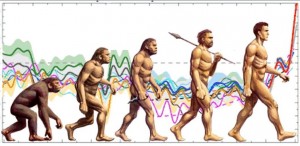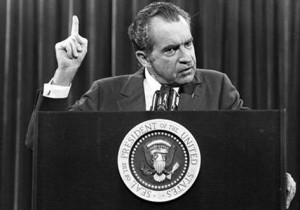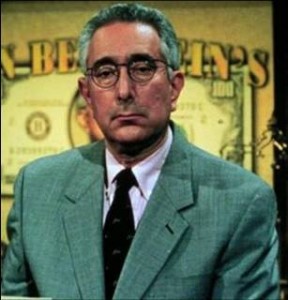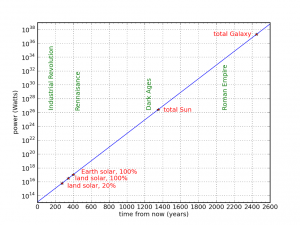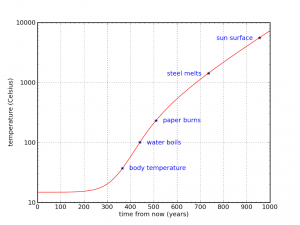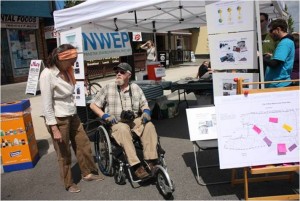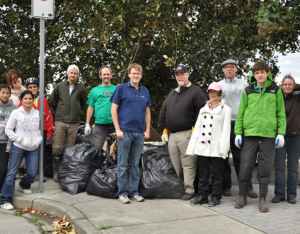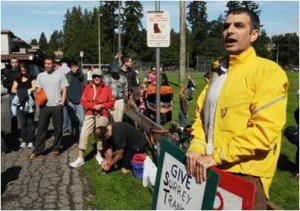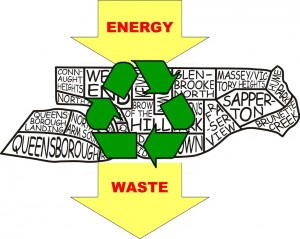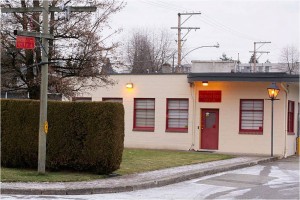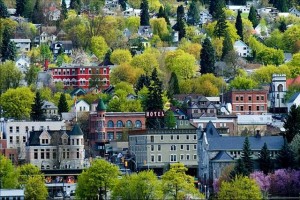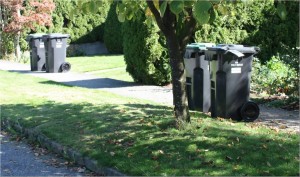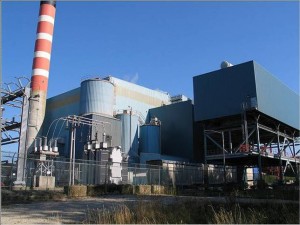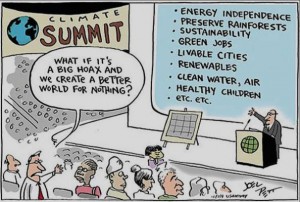The City of New Westminster kicked off their Integrated Community Sustainability Plan process – called EnVision2032 – this weekend with a two-day Sustainability event.
Saturday, there were more than 100 people in a room discussing a variety of topics, and workshopping ideas about what a more sustainable New Westminster will look like in 20 years – the planning horizon for EnVision2032. There were lively and interesting discussions, and a broad set of ideas and principles were discussed. This is only the start of a long planning process, but I think the attendees gave City Staff a good foundation upon which they can build the plan.
This followed the Friday night “inspiration” event, when the planning process was outlined, and some motivation was provided through a half-dozen speakers and a couple of video shorts. I was honoured to be one of the speakers, providing a 10-minute case for environmental sustainability and community engagement. There were accomplished community leaders on the agenda, so I kept my remarks short and light to get out of their way – the comedy relief of the evening if you will. Since I talked fast and pared it down to fit in 12 minutes of my allotted 10, I figured I would expand a bit on the speech here, with the images I used.
The following is a slightly extended version of my 10 (+2) minutes on the stage – with parts I edited out on the spot to make my allotted time.
So I care about Environmental Sustainability, for somewhat selfish reasons. I kind of like the environment the way it is. Being someone who studied ancient climates on the geologic scale in my academic life, I recognize that the biosphere has changed remarkably over the 4 billion years of life on Earth. But the environment of the last 100,000 years, the environment where humans prospered and developed things like “society” and “the economy” has been remarkable stable. Until now.
There is no reason to believe the rapid changes we are seeing now in the biosphere, from the atmosphere to the ocean to the forests, will benefit the prosperity of humans. So why are we changing it?
When an environmentalist like me comes to a mixed crowd and says we need to drive less, burn less oil and coal, use less electricity, rely more on local and seasonal food, account for the pollution we cause, etc., it is usually seen as anti-progress. The recommended “heckler” response is:
“You Suzuki types won’t be happy until we are all living in caves using candles and eating cockroaches!”
I hope to demonstrate the exact opposite is true. And to do that, I want to invoke this guy:
Who worked as an economic adviser to this dirty hippie:
…and had a son who turned in to this guy:
But back when Herbert Stein was working for that Maoist hippie commune called the American Enterprise Institute, he coined an economic truism that was so new, so profound, and so important, it became known a Steins Law:
“If something cannot go on forever, it will stop,”
When coined, Stein was talking about balance of payment deficits – and he was arguing for laissez-faire free market capitalism. In a free market, deficits cannot go on forever, so we don’t need to take action to stop them, they will stop of their own accord. (note at the time, the cumulative US debt was about $300 Billion, it is now approaching $13 Trillion).The same could of course be said of ballooning housing prices and irresponsible mortgage practices in the US in the mid 2000s. They were unsustainable, so in 2008 they stopped.
In that sense, Steins Law might be the greatest statement ever made about “Sustainability” since Bruntlund went to the UN. Stein would have said we don’t need to worry about burning the last of our oil, we don’t need to worry about removing fish from the sea faster than they can reproduce, we don’t need to worry about putting more CO2 in the atmosphere than planetary biosystems can remove… all of these things will stop eventually. The question is whether we, as a society and as an economy, decide when that stop happens, or if we just sit around and face the cold shock of it happening.
Now, a common response to this is that Malthus was wrong. Technology will come the rescue, it always has. If we run out of oil we will use natural gas; if we run out of natural gas, we will use nuclear; if we run out of uranium, we will develop fusion – the technifix is there.
The simplest answer to this approach is that it ignores that existence of fixed limits to the environment, regardless of technology. I am going to use energy use for the example, partly because I believe energy use is the #1 environmental issue on the planet today, the one all of our other issues, economic, social, or environmental, stem from, and partly because someone else already did the math for me.
Energy use over the last 400 years, on a global scale, has increased exponentially at a pretty constant rate. Through the transitions from wood and animal power to coal and steam then electricity, kerosene, refined petroleum, and nuclear energy – this gate of growth has been pretty constant. Plotted on a logarithmic scale, it is a flat line showing constant growth.
For the fun of it (and partly to demonstrate the fallacy of projecting too far into the future), Dr. Murphy projected this rate of energy use growth into the future, with hilarious results:
Note that only 400 years from now, we will need to tap 100% of the energy the planet receives from the sun. That would require 100% efficient solar panels on every square inch of the earth’s surface. A thousand years from then we will need to tap the entire energy supply of the sun. On the scale of “societies” and “economies”, 400 years is not that long a time… there are buildings built by Europeans here on the North American continent that are almost 400 years old…
Ok, the technofix to the rescue again, Why rely on the sun? In 400 years, we will use Cold Fusion or Zero Point Energy or tap the limitless energy of fairy wings. However, there are other limits. Whenever you use energy, you create heat. There is no getting around the Second law of Thermodynamics. Whenever we use energy to do something, lift a book, drive a car, smelt some steel, we create heat. The cumulative heat of this energy use is “sunk” to the biosphere. At this point, we slightly increase the heat of the planet through fossil fuel and nuclear power- much less than a degree (separate than “Global Warming” and other feedback effects, this is literally converting other types of energy to heat that must be dissipated). If we continue to grow energy use at current rates, the average temperature of the planet’s surface will double in less than 400 years. And in about 450 years, the average surface temperature on Earth will be at the boiling point of water.
Don’t worry, this can’t actually happen, as every multi-cellular form of life on the planet will be long dead – the temperature cannot continue to increase, it will stop. Just like Ben Stein’s dad told Nixon.
So, again, the question we need to ask ourselves- will we take the laissez-faire approach and leave the next generations to deal with the problem, or will we acknowledge this issue, take personal responsibility for this, and take it on now? I argue the second.
OK, if we agree that we need to do something, what to do? How do we get there? How do we get there? How do we engage and change the narrative applied to us?
Of course, you can just change things in your life. You can buy a Prius, or even stop driving altogether. You can grow your own food in your back yard, you can build a rammed-earth house with ground-source geothermal, passive solar and photovoltaics and a composting toilet and live off the grid. But that won’t change the world, because the guy living next door to you just bought an F-450 Super Duty with a 7-litre diesel for hauling his boat out the lake every weekend so he can “rip-it up”.
This isn’t going to work. To change the world, we need leaders to make the hard choices. As engaged, concerned citizens, it is up to us to empower our elected officials to make those hard decisions. Beyond choosing how we vote, we can arm them with information, we can voice our support, and we can ask them tough questions that force then to think differently.
That is what the NWEP does – and why I want to talk about the NWEP model as an example of positive engagement towards sustainability. We engage citizens and decision makers on issues around sustainability.
We reach out, as a collective, to the City and the community to move ideas forward. We run events that raise public awareness. We delegate to City Council and take part in City committees, to assure Sustainability is always a part of the conversation within the City. We reach out to City staff and share ideas, try to understand their challenges and provide solutions. We delegate to council and have less-formal discussions with elected officials, to again increase understanding on both sides, and to hopefully clear-up misconceptions about what “Sustainability” means, and about the value of a healthy environment.
We don’t protest. OK, we usually don’t protest.
Protesting can be a divisive activity- it calls into question decisions that are being made in the most aggressive way, and can put people who made decisions on the defensive. We would rather, collectively, take part in a constructive conversation and use personal conversations, the power of ideas and constructive criticism, and humour, to bring peoples’ thinking to a place where hard decisions become obvious decisions.
How do we apply this in an urban setting? What are our Sustainability goals in a developed City? The same as in other settings: reducing our externalities. Less energy in, less waste out, and creating efficiency in our internal systems.
Energy has obvious implications in New West. This City is uniquely empowered (pun) to take control of its electrical energy consumption, as we own our own electrical utility.
So where is our co-generation program? Where are our roof-top photovoltaics across our expansive south-facing slopes? Where are our small turbines? Where is our sewer heat recovery, or groundsource geothermal, our riversource geothermal?
Here is a picture of Nelson, in the West Kootenay, similar to New West in that it is full of old, inefficient, but historic buildings and it operates its own energy utility. Nelson has introduced a municipal ecosave program, where you can pay the capital cost for efficiency upgrades to your house through the savings in your power bill. This is on top of the rapidly-disappearing Federal and Provincial programs – an example of a City moving forward.
Note also the Solar Colwood program introduced by one of the earlier speakers tonight)
Waste is another area where municipalities can make tough choices. I could go on at length about the successes of the City’s solid waste diversion plans, compost-promotion and green organic waste collection system. Good news all around.
…but I could also go on at length about how burning trash for energy is inherently as unsustainable as burning coal. Its cheaper, it is easier, and it carries a certain “green” patina: it may be socially acceptable and economically prudent at this time, but it ain’t sustainable. We need to think better – and may soon need to make a tough choice here.
What about those internal systems? Places where the Urban Environment can put back, improve the world’s overall sustainability?
One example is protecting and promoting the Urban Forest- trees in the City provide remarkable benefits from reduced heating and cooling energy use to improved storm water retention, air quality improvements, habitat protection for birds and other animals. Protecting and promoting trees is an easy choice.
Living in denser, more diverse communities mean we spend less time and energy travelling between home, work, and play. This is why your average New Westminster resident drives less than your average Kelowna resident, or even your average Langley resident – this is a tangible benefit well-planned dense urban environments can provide- a “value added” to the environment.
There are harder questions I could raise. Try this: go up to any Federal or Provincial candidate and ask them when their party is going to offer a Zero-growth economic model as part of their platform. It’s inevitable that economic growth will stop. It has to, just ask Ben Stein’s father. The question is how it stops.
Can we empower our elected officials enough that they can admit this during an election cycle?
Are we going to plan a sustainable future now, when resources are still relatively plentiful and we can still have the most comfortable sustainable future possible? Or will we wait until resources are so decimated, that we are scrapping for what we can get? I don’t want to live in a cave cooking roaches over a candle- which is why we need to start now- actually we needed to start yesterday, making the choices that will protect our resources, protect our society and our economy- protect the environment that has allowed us to build this comfortable lifestyle.
Livable cities are part of the solution – and we are just getting started!
